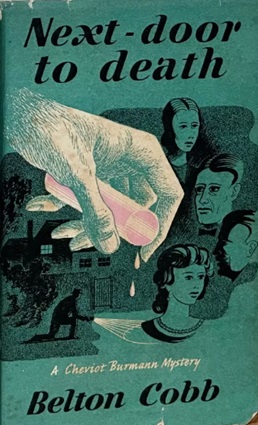Detective-Inspector Cheviot Burmann is having a bit of a sulk about how he’s too good at crosswords (they still take him an hour, so he’s not that good!) when he is called to investigate a strange case of murder. A certain Mr Rackstraw – not sure we ever get a forename – is dead, poisoned by someone lacing his beer with hydrochloric acid. The odd thing, though, is that he isn’t found in his own home. He is in the front room of the house next door…
Burmann immediately takes a dislike to Mr Gingold, a writer and the neighbour who found the body. Convinced Gingold is having an affair with Rackstraw’s wife, Burmann’s investigation immediately focusses on him, but when it becomes clear that Rackstraw was far from an honest man, the circle of suspects widens… a bit.
So, back to Belton Cobb, the author who I own far too many books of to stop collecting now. He’s no Brian Flynn, obviously, but there’s something about his books that keeps bringing me back, even when, as can be the case, they’re rubbish.
I should say, this isn’t a rubbish one, but you’ll probably never be able to check, dear reader. It follows all of the Cobb clichés. The murder weapon is poison. There’s an incredibly small circle of suspects all of which we meet early on. Burmann gets obsessed over a suspect. But even with a circle of four suspects, the suspicion does bounce around a bit more than usual, even if you can narrow it down simply by expectations.
Burmann at this point has returned to investigative duties after spending four years filing paperwork. In No Mercy For Margaret, he got a bit weird with his obsession over someone’s apparent guilt, even if all she was guilty of was being a woman. We’re still a little way off him meeting his true love, which is probably a good thing based on this –
“Once upon a time, Cheviot has been entirely hard-hearted about women – at any rate when they were among his suspects. But as he had dealt with records and dossiers instead of suspects for the last four years, he had got into the habit of regarding women primarily as women. It was, he knew, a failing which he would have to check.”
Um, what? And…
“When the case came to court, there would be no difficulty over the motive, juries being generally made up of men and women of the world who had perfectly normal views about sex cravings.”
You do wonder what possessed Cobb to introduce a female lead later in the series in the form of Kitty Armitage, as some of the writing involving her is just as weird.
Anyway, back to the book, and if you can overlook Burmann’s odd flashes of attitude and the fact that he has a habit of twisting the facts to fit his theories, there’s an effective tale here that by the end, I found strangely moving. It’s not a classic, and it’s not Cobb’s best work by far, but it’s a huge step up from No Mercy For Margaret.

